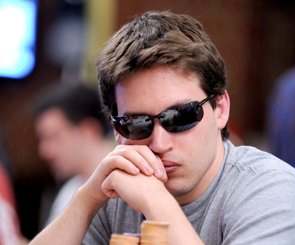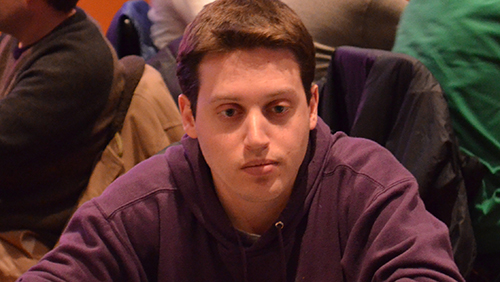There were just nine players remaining at the Season IX World Poker Tour (WPT) event in Amneville, when I thought that Scott Baumstein could be something special. He had dominated the field, and the only player who decided to take a stand was a diminutive Frenchman called Adrien Allain.
 Baumstein opened to 38k in early position, Allain three-bet to 100k, just one seat to his left and the action folded back around to Baumstein. The American four-bet to 250k and the young Frenchman moved half a million across the line in a fifth bet. Back to Baumstein and he immediately clicked it back to one million forcing the instant muck from Allain.
Baumstein opened to 38k in early position, Allain three-bet to 100k, just one seat to his left and the action folded back around to Baumstein. The American four-bet to 250k and the young Frenchman moved half a million across the line in a fifth bet. Back to Baumstein and he immediately clicked it back to one million forcing the instant muck from Allain.
“You can get away with three betting those over there {pointing to the rest of the field}…but not me,” said Baumstein before showing the table [Ks] [Td].
Allain would have the ultimate revenge by winning the tournament, but Baumstein made his mark with a fourth place score for six figures. He would take that momentum into the Masters Classic in Amsterdam where he would win the High Roller for another six figure score.
Baumstein’s antics in Amneville garnered the attention of the WPT and he was soon being asked to help support the tour in a commentary capacity.
“I got into the booth at the World Poker Tour in Venice and did a good job. Then I ended up doing spots for PokerStars, PartyPoker and the World Series of Poker (WSOP).” Said Baumstein.
I’m not privy to the financial arrangements that are offered to the players willing to spend time in the commentary booth; but unless your name is Phil Hellmuth I doubt there is much cash available to be splashed. So why do players spend their time away from cards, watching cards?
“It’s not a great financial endeavor that’s for sure, but I do learn a great deal when I am in the commentary booth. I get to see the hole cards, in real time, of some of the best players in the world. It really helps you to get into the minds of these players. You are also forced to think through the hands, with your fellow commentators, and that really helps. I have learned so much in the commentary booth, it’s free education and it’s really helped my game.”
The word on the street is that Baumstein is one of a group of victims of yet another poker playing cheat. A thief who has taken money from the pockets of his so called friends before doing a Harry Houdini.
“I have been involved in in situations where people have borrowed money, or bought action from events, and haven’t paid it back. Unfortunately, this thing happens in poker. I was a little naive when I first started playing. I thought a lot of these agreements were done via good old-fashioned handshakes, and that was taken seriously. But times have changed. The community seems to look the other way. There have been a lot of stories and reoccurring incidents with a lot of guys. Everyone knows their names so I don’t have to mention them.
“Maybe the Tournament Directors Association (TDA) could do a better job of not welcoming known cheats and scammers? These people are thieves; there is no other way of putting it. There is no persecution at all. Maybe there should be a Griffin List equivalent for poker, so if guys are caught cheating, or stealing, whilst playing on one tour they couldn’t be allowed to play on another tour? If this type of cheating occurred in Blackjack, the casinos would tell the other casinos who these players were. Poker players should be given this protection and sometimes it seems there is no-one looking out for the poker player, and instead the tours and casinos are just looking out for their own interest. The interest of the house.”
Baumstein’s voice quickens with the intensity of his volley. This is something he feels passionate about, and I echo his sentiments. There is a lot of money being passed around the poker world, and there is scant protection for its security. But poker is too fragmented, and until it unites, cheats will always find the darkened corners to spin their next batch of fantastical tales.
When poker players are hitting the peak of their variance, these unpaid loans just seem like minor irritations. But the pools are drying up. People are desperate for the missing cash. Backers at the lowest level of the game seem to be much more difficult to find. Does Baumstein have any ideas on how this situation can be improved?
“The problem we face is nobody’s life is ever going to be long enough to withstand variance. Some people are going to lucky and some people aren’t, and we just have to accept that.
“One of the problems we have macro economically is how the pay structures are set out. Over the years they have been improved, however, there are a couple of steps needed to be taken across the board to improve them further. There should be more spots paid and the structure should be flatter up top. I understand that big top prizes attract people, but we need more people earning in the six-figure range versus fewer people earning in that million-dollar range. You can hit a fourth place and it isn’t enough to cover your year. Only 10% of the field generally cashes meaning the casual player’s are going to get dejected. Give them a positive re-enforcement with more min-cashes. And make it flatter up top so more people stay in the business. Otherwise we would slowly break the community.”
